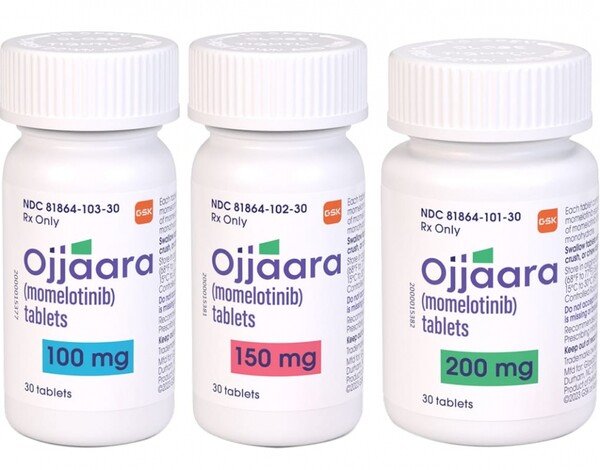GSK Korea said that its myelofibrosis treatment, Ojjaara (ingredient: momelotinib dihydrochloride hydrate), has received approval from the Ministry of Food and Drug Safety (MFDS) for the treatment of adult patients with intermediate- or high-risk myelofibrosis who experience anemia.

Ojjaara is a novel inhibitor that blocks three key signaling pathways -- JAK1, JAK2, and ACVR1 (activin A receptor type 1). It is administered orally at a recommended dose of 200mg once daily, regardless of food intake.
Myelofibrosis is a serious and rare blood cancer characterized by progressive bone marrow fibrosis, anemia, thrombocytopenia, and splenomegaly. Patients with anemia, in particular, face poorer prognoses. According to research, 87 percent of myelofibrosis patients present with anemia at the time of diagnosis, and 46 percent still require transfusions after one year of treatment.
Anemia has been found to double the risk of mortality compared to other prognostic factors such as age and leukocytosis.
Globally, myelofibrosis affects approximately 1 in 100,000 people, with about 2,292 patients in Korea receiving inpatient or outpatient treatment for the disease as of 2023.
The MFDS approved Ojjaara based on results from two phase 3 clinical trials, SIMPLIFY-1 and MOMENTUM, which demonstrated the treatment’s efficacy in reducing anemia-related transfusion dependency while managing other symptoms such as splenomegaly.
The SIMPLIFY-1 trial compared Ojjaara to ruxolitinib in 432 treatment-naïve adult patients with myelofibrosis. Results showed that Ojjaara was non-inferior to ruxolitinib in reducing spleen volume by at least 35 percent after 24 weeks of treatment.
Notably, 66.5 percent of patients receiving Ojjaara achieved transfusion independence compared to 49.3 percent of those on ruxolitinib.
The MOMENTUM trial evaluated Ojjaara in 195 patients who had previously been treated with a JAK inhibitor and experienced symptoms and anemia.
The trial compared Ojjaara to danazol, with the primary endpoints being total symptom score (TSS) improvement and transfusion independence.
After 24 weeks, 25 percent of Ojjaara-treated patients saw a 50 percent or greater reduction in TSS, compared to 9 percent of those treated with danazol. Furthermore, 30 percent of Ojjaara patients achieved transfusion independence within the first 12 weeks of treatment, compared to 20 percent of danazol patients.
Spleen volume reduction of 35 percent or more was achieved by 22 percent of Ojjaara-treated patients, compared to only 3 percent in the danazol group.
The most common non-hematologic adverse events reported with Ojjaara were diarrhea and nausea, with thrombocytopenia being the most frequent Grade 3 or higher adverse event.
"Despite existing treatments, there has been an unmet medical need for managing anemia in myelofibrosis patients,” said Yang Yoo-jin head of GSK Korea's Oncology and HIV business unit. “Ojjaara, by targeting all three key signaling pathways involved in the disease, offers not only significant symptom relief but also improves long-term outcomes, particularly for patients suffering from anemia.”
Related articles
- GSK’s Tdap vaccine suspended in Korea due to packaging defect
- GSK, GC, SK, Yuhan acquitted in NIP vaccine bid-rigging case
- GSK launches 1st meningococcal B vaccine Bexsero in Korea
- Jemperli improves OS vs. standard care in 1st-line endometrial cancer care
- GSK Korea announces discontinuation of DTaP-IPV vaccine supply
- GSK’s Shingrix tops singles vaccine sales in Korea in 2023: IQVIA data
- GSK Korea launches myelofibrosis treatment Omjjara

